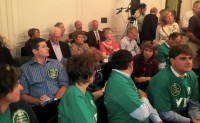FASNY Hearing Extended to October 30

As the second session of the public hearing on the French American School of New York’s application for a special permit to operate a regional educational institution in the White Plains R-130 zone off of Ridgeway came to a close, it was just as quickly adjourned to October 30.
After several hours of five-minute, some taking longer and others a bit shorter, presentations both for and against the project, Michael Zarin, the attorney representing FASNY, said he wanted to go on the record with a statement that the confusion about the time when the speaker sign-up sheet would be available earlier in the day had caused many people to leave before they were called to the podium.
Apparently, people arriving at 6:30 p.m. with the intention of speaking found dozens of names before them on the list. It was understood that sign-up would begin at 6:30 p.m. and not earlier.
Mayor Tom Roach immediately consulted with city attorneys. With the approval of the Common Council the hearing was adjourned to allow those who had signed up but who had not had the opportunity to speak to return at a later scheduled date.
Accepting this turn of events Zarin then referred to a presentation made at the first hearing showing the number and size of major institutional entities in the neighborhood surrounding the FASNY property.
Using the map showing large areas occupied by these institutions, Zarin said: “The FASNY perspective and planned use for the school is not inconsistent with the current make-up of the Gedney neighborhood. This is already a multi-use neighborhood and that might be one of the ingredients that has made the neighborhood so stable.”
Earlier in the evening FASNY proponents presented a traffic plan intended to bring school traffic almost entirely onto school property to keep traffic on neighborhood streets flowing. They indicated they were currently in discussion with members of the Westchester County and White Plains traffic commissions as well as with the New York State Department of Transportation. Neighbors of the proposed project and some from different White Plains neighborhoods spoke from an opposing point of view. Many had studied the DEIS and were prepared with alternative studies and presentations of their own.
Increasing traffic volume, safety and pollution were primary concerns of residents. Some questioned how a winding country road without shoulders or sidewalks could accommodate increased traffic and additional traffic lights. Those whose driveways empty directly onto Ridgeway expressed concern they would never be able to get out.
Drainage and storm water management in the area that is often referred to as the headwaters of the Mamaroneck River was another point of concern.
The Mayor of the Village of Mamaroneck cautioned the Council that whatever decision they made must take into consideration the risk of down stream flooding. “The Village of Mamaroneck suffers greatly,” he said.
Others suggested that studying surface water flow was not enough and research must be done to determine what streams have gone underground.
Several members of White Plains’ environmental organization EcoNeighbors discussed why the FASNY location was not suitable for a large school project, especially because the transportation plan seemed focused solely on the use of automobiles and not public transportation. They asked why environmental groups outside of White Plains had thrown their support to the FASNY project without ever consulting with the environmental groups within White Plains.
Adherence to the guidelines presented in the White Plains Comprehensive Plan, the current market for golf club purchases, noise levels, the question of whether 40 or 85 houses could be built if the zoning was left untouched, the economic value of non-for-profits on a neighborhood, and what it takes to reach a compromise, all of these topics were touched upon. Even a representative from the Business Council of Westchester came out to support FASNY.
White Plains resident Paul Schwarz eloquently pointed out the contest of competing visions. Everyone has a dream. FASNY had a dream when they moved in as did the neighboring residents when they made their moves to the Gedney neighborhood. Schwarz cautioned that money should not be the dream-maker in this case.
This challenge goes before the governing body of the entire White Plains community.
If you had signed the sheet to speak, but did not get a chance, the FASNY DEIS public hearing has been adjourned to Tuesday, Oct. 30 at 7 p.m. Only those who had previously signed up and did not speak will be able to address the Council. The deadline for written comments to be submitted to the city clerk is Friday, Nov. 9.
